- NEED HELP? CALL US NOW
- +919995411505
- [email protected]
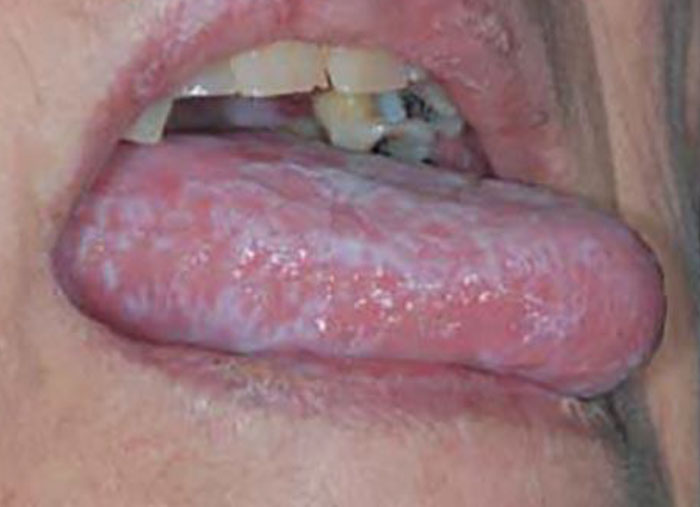
Tongue Conditions
1) Thrush (candidiasis):
Candida albicans (a yeast) grows over the surface of the mouth and tongue. Thrush can occur in almost anyone, but it occurs more often in people taking steroids or with suppressed immune bsystems, the very young, and the elderly.Oral thrush causes creamy white lesions, usually on your tongue or inner cheeks. Sometimes oral thrush may spread to the roof of your mouth, your gums or tonsils, or the back of your throat.
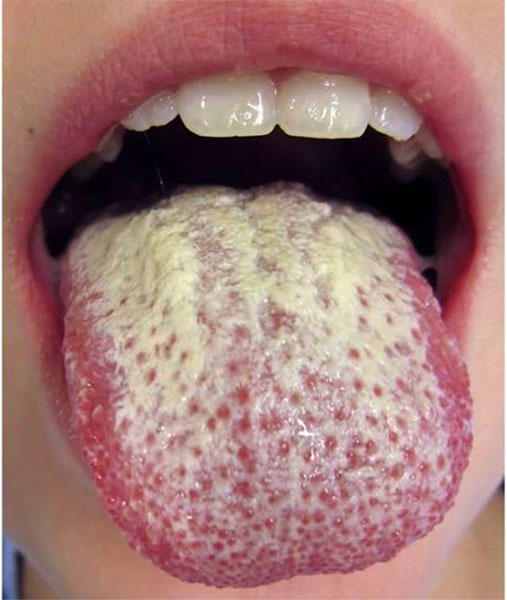
2). Oral Cancer
A growth or ulcer appears on the tongue and grows steadily. Oral cancer is more common in people who smoke and/or drink alcohol heavily.
Mouth cancer, also known as oral cancer, is where a tumour develops in a part of the mouth. It may be on the surface of the tongue, the inside of the cheeks, the roof of the mouth (palate), the lips or gums.
Tumours can also develop in the glands that produce saliva, the tonsils at the back of the mouth, and the part of the throat connecting your mouth to your windpipe (pharynx). However, these are less common.
The symptoms of mouth cancer include:
- Mouth ulcers that are painful and do not heal within several weeks
- Unexplained, persistent lumps in the mouth or the neck that do not go away
- Unexplained loose teeth or sockets that do not heal after extractions
- Unexplained, persistent numbness or an odd feeling on the lip or tongue
- Sometimes, white or red patches on the lining of the mouth or tongue these can be early signs of cancer, so they should also be checked
- Changes in speech
Mouth cancer is categorised by the type of cell the cancer (carcinoma) starts to grow in.
Squamous cell carcinoma is the most common type of mouth cancer, accounting for 9 out of 10 cases.
Squamous cells are found in many areas of the body, including the inside of the mouth and in the skin.
Less common types of mouth cancer include:
- Adenocarcinoma, which is cancers that develop inside the salivary glands
- Sarcoma, which grows from abnormalities in bone, cartilage, muscle or other tissue
- Oral malignant melanoma, where cancer starts in the cells that produce skin pigment or colour (melanocytes). These appear as very dark, mottled swellings that often bleed
- Lymphoma, which grows from cells usually found in lymph glands, but they can also grow in the mouth
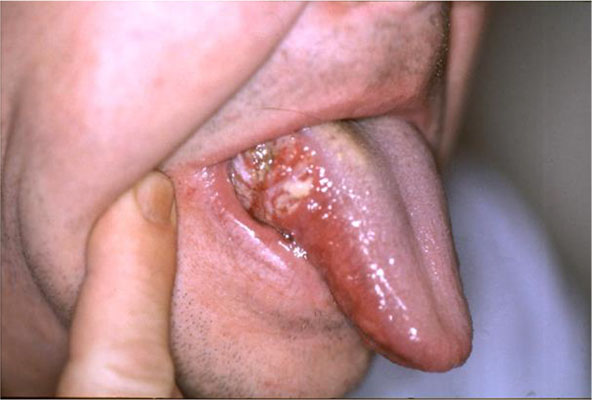
3). Macroglossia (big tongue)
This can be broken down into various categories based on the cause. These include congenital, inflammatory, traumatic, cancerous, and metabolic causes. Thyroid disease, lymphangiomas, and congenital abnormalities are among some of the bcauses of an enlarged tongue.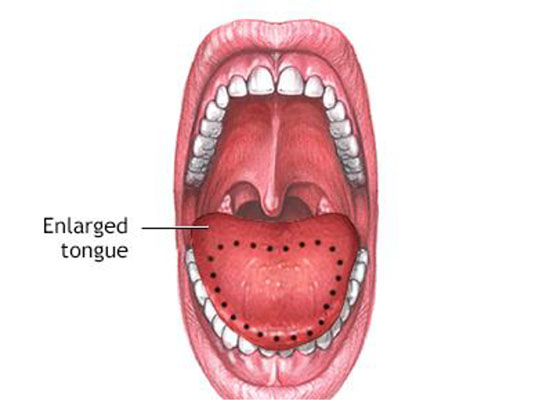
4). Geographic tongue
Ridges and colored spots migrate over the surface of the tongue, periodically changing its appearance. Geographic tongue is a harmless condition. Geographic tongue results from the loss of tiny hairlike projections (papillae) on your tongue's surface. This papillae loss appears as smooth, red patches of varying shapes and sizes. Geographic tongue is an inflammatory but harmless condition affecting the surface of your tongueETIOLOGY
- People with eczema and psoriasis.
- People with airborne allergies.
- People with diabetes, particularly Type 1 diabetes.
- People with reactive arthritis.
- Women and people assigned female at birth (AFAB) who use oral contraceptives.
- People with vitamin deficiencies, including zinc, iron, folic acid and vitamins B6 and B12.
- People with fissured tongue, a condition that causes deep grooves or wrinkles on your tongue.
- People dealing with emotional stress.
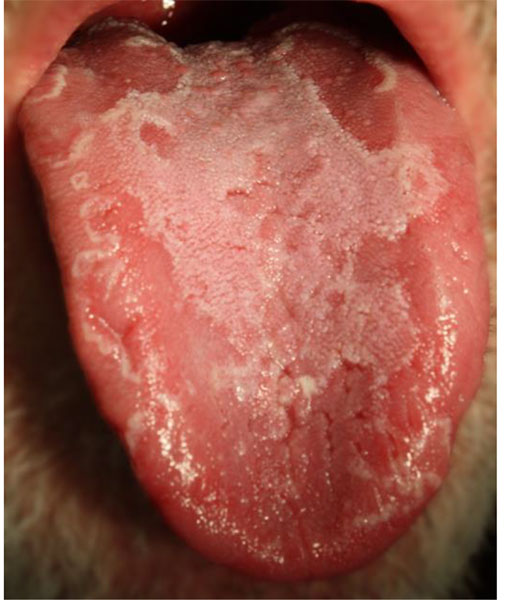
5). Burning mouth/burning tongue syndrome
A relatively common problem. The tongue feels burned or scalded, or strange tastes or sensations develop. Apparently harmless, burning mouth syndrome may be caused by a mild nerve problem.Primary BMS means there is no identifiable cause. Burning mouth can be a symptom of many illnesses or diseases. As a result, diagnosing this condition is difficult and often a matter of exclusion.
Secondary BMS, on the other hand, has a clear, identifiable cause. This can vary from person to person. Possible causes include:
- hormonal changes
- allergies
- dry mouth
- medication
- nutritional deficiency, such as iron, zinc, or B vitamin deficiency
- mouth infection
- acid reflux
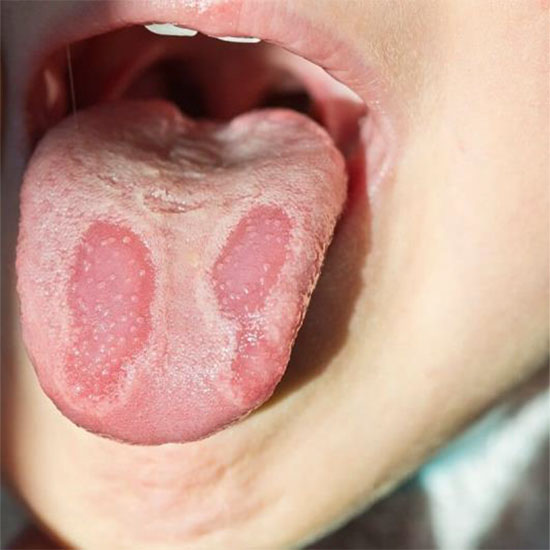
6). Atrophic glossitis (bald tongue)
The tongue loses its bumpy texture, becoming smooth. Sometimes this is due to deficiencies of some major nutrients including riboflavin, niacin, pyridoxine, folic acid, vitamin B12, iron, zinc, and vitamin E.Condition characterised by absence of filiform or fungiform papillae on the dorsal surface of the tongue.
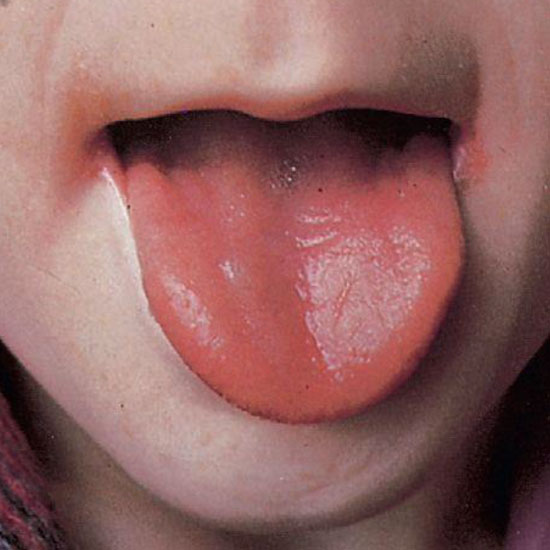
7). Canker sores (aphthous ulcers):
Small, painful ulcers appear periodically on the tongue or mouth. A relatively common condition, the cause of canker sores is unknown; they are unrelated to the cold sores caused by herpes viruses. Canker sores are not contagious.
Factors that seem to trigger outbreaks of ulcers include:
- Emotional stress and lack of sleep
- Mechanical trauma, for example, self-inflicted bite
- Nutritional deficiency, particularly of vitamin B, iron, and folic acid
- Certain foods, including chocolate
- Certain toothpastes; this may relate to sodium lauryl sulphate (the foaming component of toothpaste)
- Menstruation
- Certain medications, including nicorandil, given for angina
- Viral infections
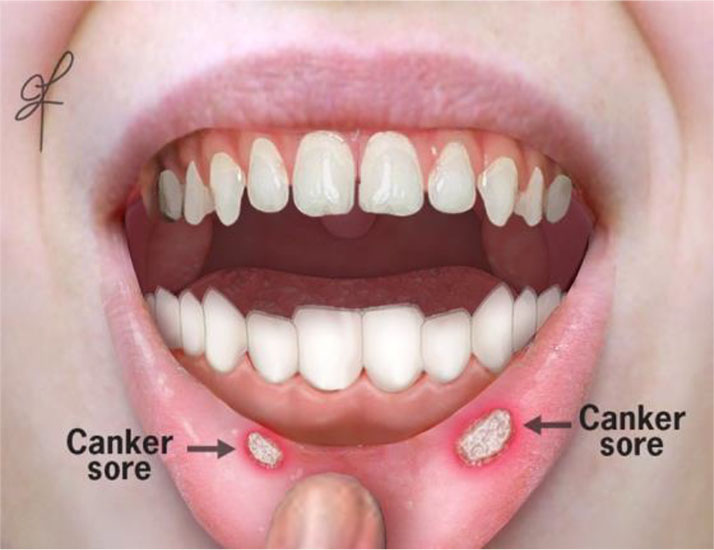
8). Oral leukoplakia
White patches appear on the tongue that can’t be scraped off. Leukoplakia may be benign, or it can progress to oral cancer.
9). Hairy tongue
Papillae can overgrow the surface of the tongue, giving it a white or black appearance. Scraping off the papillae corrects this harmless condition.
Signs and symptoms of black hairy tongue include:
- Black discoloration of the tongue, although the color may be brown, tan, green, yellow or white
- A hairy or furry appearance of the tongue
- Altered taste or metallic taste in your mouth
- Bad breath (halitosis)
- Gagging or tickling sensation, if the overgrowth of the papillae is excessive
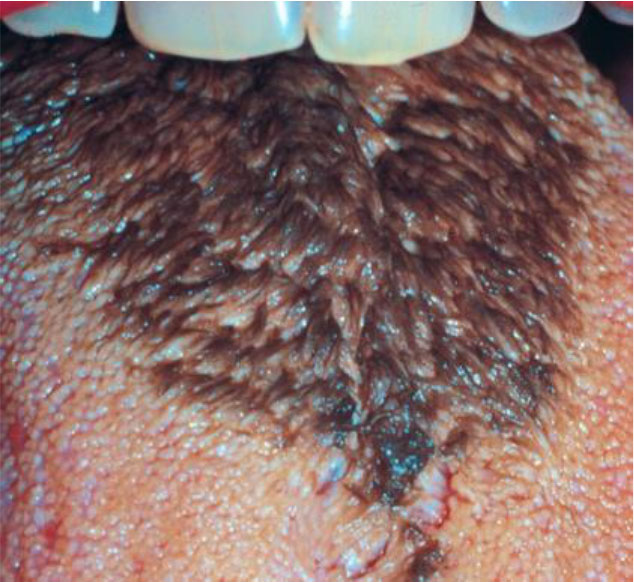
10). Herpes stomatitis:
The herpes virus can uncommonly cause cold sores on the tongue. Herpes virus cold sores are usually on the lip.
Manifestation of herpes simplex virus type 1 (HSV-1) and is characterized by high-grade fever and painful oral lesions.
Herpetic gingivostomatitis most commonly occurs in children from ages 6 months to 5 years, it may also occur in adults.
HSV-1 is usually spread from direct contact or via droplets of oral secretions or lesions from an asymptomatic or symptomatic individual. Once a patient is infected with the herpes simplex virus, the infection can recur in the form of herpes labialis (cold sores) with intermittent reactivation occurring throughout life
11). Lichen planus
A harmless condition that can affect the skin or the mouth. The cause is unknown; however, it is believed to be caused by the immune system attacking the skin and lining of the mouth.
The lesions may appear as-
- Lacy, white, raised patches of tissues
- Red, swollen, tender patches of tissues
- Open sores
- Burning sensation or pain
- Sensitivity to hot, acidic or spicy foods
- Bleeding and irritation with tooth brushing
- Inflammation of the gums (gingivitis)
- Painful, thickened patches on the tongue
- Discomfort when speaking, chewing or swallowing
- Other types of lichen planus
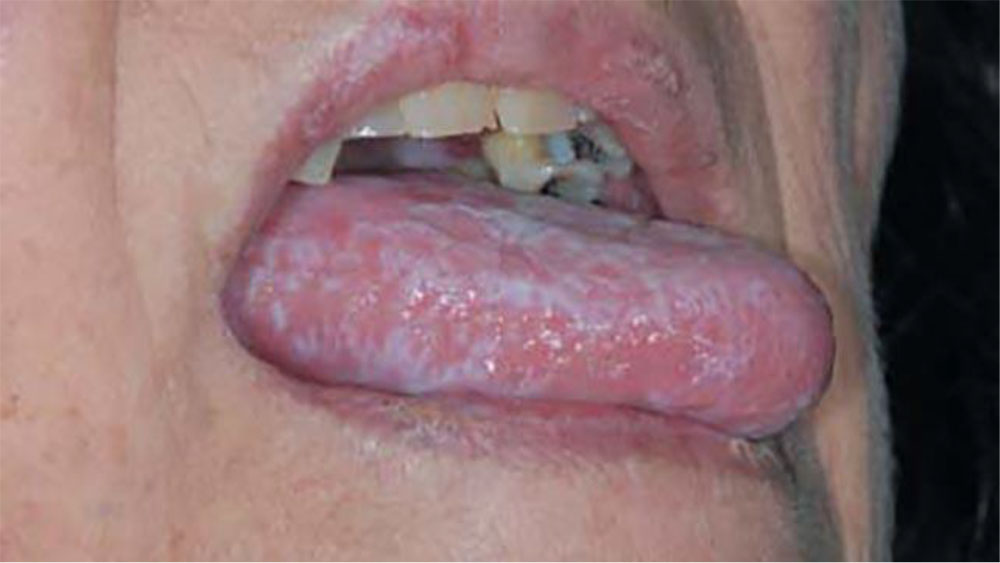
Tongue Treatments
- Steroid gel: Applying a prescription steroid gel like Lidex hastens the resolution of canker sores.
- Silver nitrate: Doctors can apply this chemical to a canker sore, speeding healing and relieving pain.
- Viscous lidocaine: Applied to the tongue, lidocaine gel provides immediate, though temporary, pain relief.
- Antifungal medicines: Antifungal drugs can eliminate Candida albicans, the thrush-causing fungus. Swish-and-spit mouthwash and pills are both effective.
- Tongue scraping: Simply scraping the tongue can usually remove the overgrown papillae causing black or white hairy tongue.
- B vitamins: A B vitamin supplement can correct a vitamin deficiency, if present.
- Tongue surgery for conditions like oral cancer or leukoplakia




